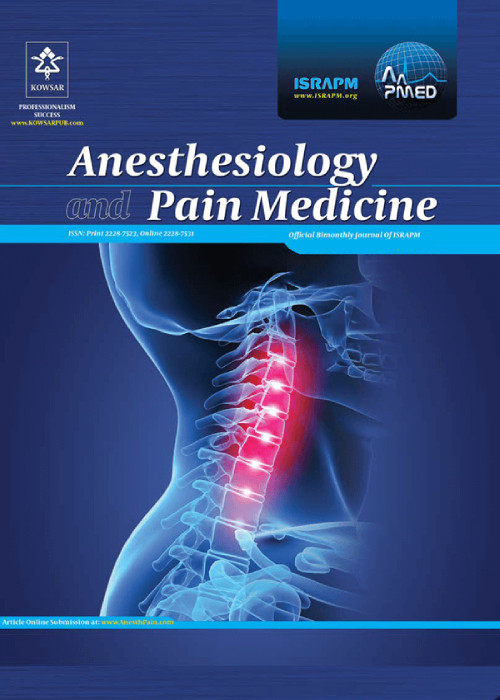The Effect of Intravenous Infusion of Dexmedetomidine to Prevent Bleeding During Functional Endoscopic Sinus Surgery: A Clinical Trial
Author(s):
Abstract:
Background
Bleeding during surgery can lead to serious complications. Methods and drugs to control bleeding are always important both for the surgeon and anesthesiologist, especially in endoscopic procedures. A lot of efforts are made to optimize the surgical conditions for functional endoscopic sinus surgery. Induced hypotension is widely advocated to prevent bleeding and consequently to improve the quality of an operation . Amongst the pharmacological agents, dexmedetomidine is the most recently introduced drug to provide hypotensive anesthesia during functional endoscopic sinus surgery.Objectives
The current study aimed at investigating the effects of intravenous infusion of dexmedetomidine on bleeding, nausea, awakening time, and other intravenous anesthetic doses during functional endoscopic sinus surgery.Methods
Sixty patients aged 16 to 60 years with American society of anesthesiologists (ASA) class I or II in Imam Khomeini hospital of Ahvaz, Iran, who were the candidate for the elective functional endoscopic sinus surgery were enrolled in the current double-blind clinical trial. They were randomly divided into 2 groups: group D (receiving dexmedetomidine), and group N (receiving normal saline). Sampling was based on the block randomization method. In group D, a 1-μg/kg dexmedetomidine was injected during 10 minutes just before the induction. Then, 0.5 µg/ kg/ hour infusion was started. Both groups had the same induction and maintenance method as well as the drugs administered for general anesthesia induction. For maintenance, the patients received O2 50%: N2O 50% and 100 μg/kg/minute of propofol and 0.2 μg/kg/minute of remifentanil. In group N, instead of dexmedetomidine in bolus and maintenance, normal saline was used with the same volume. Mean arterial pressure was maintained between 65 to 75 mmHg. The incidence of bleeding, nausea and vomiting after surgery, the amount of maintenance drugs, and awakening time were recorded in a checklist.Results
The intravenous use of dexmedetomidine significantly reduced the amount of bleeding (P Conclusions
The current study showed that although propofol and remifentanil compounds can control hemodynamic state, but intravenous infusion of dexmedetomidine during the functional endoscopic sinus surgery reduced the amount of bleeding more significantly. It also reduced the dosage of maintenance drugs.Keywords:
Language:
English
Published:
Anesthesiology and Pain Medicine, Volume:7 Issue: 4, Aug2017
Page:
4
magiran.com/p1749120
دانلود و مطالعه متن این مقاله با یکی از روشهای زیر امکان پذیر است:
اشتراک شخصی
با عضویت و پرداخت آنلاین حق اشتراک یکساله به مبلغ 1,390,000ريال میتوانید 70 عنوان مطلب دانلود کنید!
اشتراک سازمانی
به کتابخانه دانشگاه یا محل کار خود پیشنهاد کنید تا اشتراک سازمانی این پایگاه را برای دسترسی نامحدود همه کاربران به متن مطالب تهیه نمایند!
توجه!
- حق عضویت دریافتی صرف حمایت از نشریات عضو و نگهداری، تکمیل و توسعه مگیران میشود.
- پرداخت حق اشتراک و دانلود مقالات اجازه بازنشر آن در سایر رسانههای چاپی و دیجیتال را به کاربر نمیدهد.
In order to view content subscription is required
Personal subscription
Subscribe magiran.com for 70 € euros via PayPal and download 70 articles during a year.
Organization subscription
Please contact us to subscribe your university or library for unlimited access!


